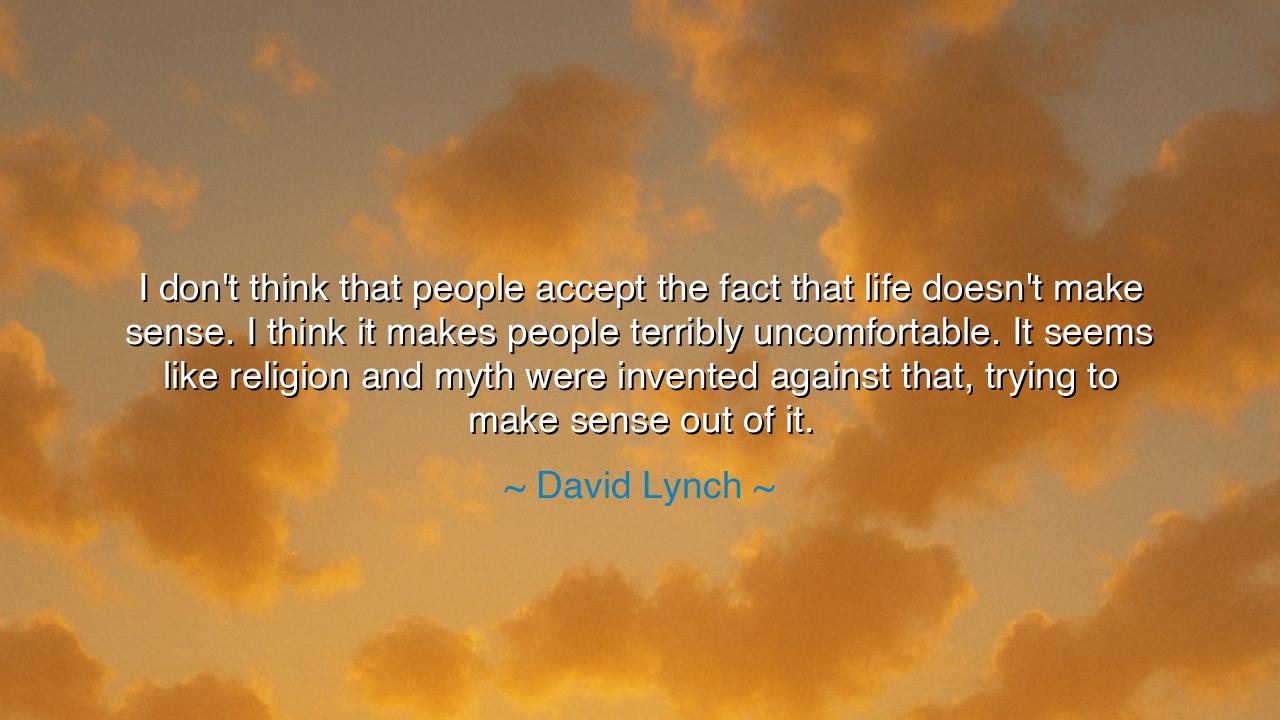
I don't think that people accept the fact that life doesn't make
I don't think that people accept the fact that life doesn't make sense. I think it makes people terribly uncomfortable. It seems like religion and myth were invented against that, trying to make sense out of it.






“I don’t think that people accept the fact that life doesn’t make sense. I think it makes people terribly uncomfortable. It seems like religion and myth were invented against that, trying to make sense out of it.” — these haunting words from David Lynch, the visionary filmmaker and dreamer, pierce the veil of human illusion. They speak to one of the oldest and most unsettling truths: that life, in its essence, is mystery. It is a vast, shifting sea without map or measure. And yet, through the ages, mankind has tried again and again to draw lines upon its surface — to give reason to the unreasonable, order to the infinite. Lynch’s reflection is not an act of despair, but a revelation: that perhaps meaning is not something to be found, but something to be made in the face of chaos.
Since the dawn of time, human beings have feared the void — that trembling realization that existence does not follow a script, that joy and sorrow, birth and death, rise and fall without logic or fairness. Out of this fear were born myth and religion, those luminous stories woven to make the world bearable. They told us that gods shaped our fates, that there was justice beyond the grave, that storms, wars, and sufferings all served a hidden plan. And perhaps they did — for myth, at its best, was not deception but medicine for the mind. It gave the lost a compass, the broken a reason to endure. Yet Lynch reminds us that these stories were born not from certainty, but from the terror of meaninglessness.
In ancient Greece, when Oedipus sought to unravel the mystery of his life, he found not truth but horror — that his search for understanding led him into the very darkness he feared. The philosophers that came after — Socrates, Plato, and later the Stoics — tried to bring light where myth had ruled, yet even they could not answer the oldest question: Why are we here? Some, like the Stoic Marcus Aurelius, found peace in acceptance, writing, “The universe is change; life is opinion.” Others raged against the void, building temples of logic where faith had fallen. Yet the mystery remained, indifferent to both prayer and philosophy.
History, too, has shown us that even in the modern age, when science took the place of gods, the hunger for meaning did not vanish. When the old myths faded, new ones arose — nations, ideologies, progress — all attempts to replace the unknowable with the understandable. But still, suffering continued. Still, life refused to fit within the clean lines of reason. The poet Albert Camus, facing this same truth, called it the absurd — the eternal conflict between humanity’s need for meaning and the universe’s silence. He did not tell us to flee it, but to embrace it — to live fully despite its nonsense, and perhaps, through that defiance, to find our truest strength.
David Lynch, in his art and words, walks this same path. His worlds are surreal, filled with beauty and terror intertwined, because he understands that the subconscious is closer to reality than reason is. To him, life’s contradictions — the dream and the nightmare — are not flaws but the essence of being alive. His statement is both a lament and an invitation: a lament for those who cannot live without answers, and an invitation to those brave enough to dwell within the mystery. To accept that life doesn’t make sense is not to surrender, but to awaken — to see the raw beauty of chaos, to feel the pulse of existence without demanding it justify itself.
And yet, this acceptance requires courage. For to release the need for meaning is to stand naked before the universe. The mind trembles before uncertainty, reaching instinctively for the comfort of systems and stories. But the wise know: even if the heavens hold no plan, we can still create meaning through love, art, kindness, and wonder. We may not understand the purpose of the stars, but we can still marvel at their light. We may not grasp the reason for pain, but we can still choose compassion. This is the secret Lynch gestures toward — that life’s beauty is not in its sense, but in its mystery.
So, dear seeker, learn to be at peace with not knowing. When the night feels endless and the questions burn unanswered, do not rush to fill the silence with easy truths. Sit with the chaos. Listen to it. Let it teach you humility and awe. Do not demand that life make sense — make meaning out of your own living. Write your own myth in every act of courage, every moment of wonder, every breath of gratitude.
For in the end, perhaps that is the hidden purpose of a senseless life — to make of it something sacred through our own choosing. The gods may not whisper the plan, the stars may remain silent, but still we rise each morning to create, to love, to dream. And in that act, we become divine — not because we have understood life, but because, despite its madness, we have chosen to live it fully.






AAdministratorAdministrator
Welcome, honored guests. Please leave a comment, we will respond soon